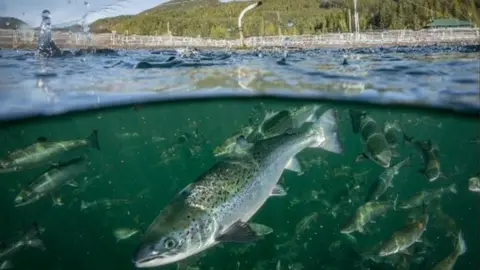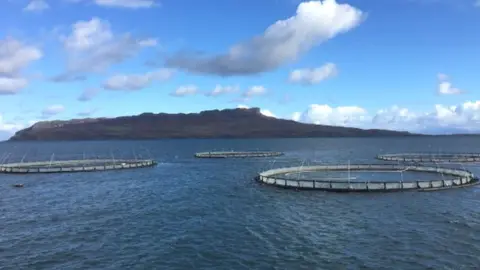Mowi offers to exit two 'contentious' Scottish sites
 Mowi
MowiSalmon farming giant Mowi has offered to close two "contentious" Scottish sea loch sites in exchange for permission to relocate them to offshore waters.
Mowi said it had identified its sites at Loch Ewe and Loch Duich as "candidates for relocation".
It also cited their proximity to sensitive wild salmonid habitats as reasons for the move.
Mowi said it was seeking "locations more appropriate for modern day aquaculture".
The world's biggest salmon farming company wants to expand into "new high-energy farming areas located further offshore" as part of a longer term plan.
Mowi, formerly known as Marine Harvest, already operates two such sites off the Isle of Muck and the Isle of Rum.
Mowi Scotland managing director Ben Hadfield said it was the company's ambition to "close contentious locations, jointly working with wild fishery managers".
He said: "Mowi has strived to improve relations with the wild fish sector and has been clear that it will seek to expand its operations in Scotland, whilst securing reduced impact on the environment and further developing the significant economic contribution that it makes to rural Scotland.
"In the absence of a regulatory framework that enables relocation of a farm's biomass, we are wanting to engage with our government, environmental groups and salmon fishery boards to pursue this opportunity.
"The sites will be closed permanently conditional to the support from our regulatory system to transfer the biomass to other locations, and to sustainably expand our production in the best possible areas for salmon farming, thus protecting the associated jobs."
 Mowi
MowiMowi said it wanted to "align" its growth plans with recommendations from the Scottish Parliament's Rural Economy and Connectivity Committee (RECC) on potential ways to minimise risk to wild salmon and improving the locations of existing farms.
The Wester Ross Area Salmon Fishery Board said it welcomed "Mowi's recognition that enclosed sea lochs near to sensitive wild salmonid habitat could increase localised impact on wild salmonids".
'Conditional' support
Convener Bill Whyte added: "We will expect further clarity about the process of biomass relocation.
"However, if Mowi can provide evidence through EIA (environmental impact assessment) and Sepa regulatory structure that the relocated biomass will have reduced potential impact on wild migratory fish, then we would be prepared to support biomass relocation on a conditional basis."
Andrew Graham-Stewart, director of Salmon and Trout Conservation Scotland, said his organisation welcomed Mowi's decision to close the Loch Ewe farm.
He added: "Mowi has signalled its intention to move the biomass elsewhere.
"If Mowi wishes to apply for a biomass increase at another location, then that should be judged on its own merits.
"Furthermore it is vital that any biomass increase elsewhere avoids migration routes for wild salmonids."
Norwegian-owned Mowi is a global company which produces up to 60,000 tonnes of salmon each year in the UK alone.
